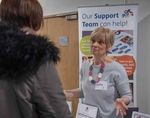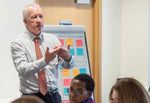SDS National Voice 2020 An overview - Making space for better conversations - #SDSNV20 - Self Directed Support ...
←
→
Page content transcription
If your browser does not render page correctly, please read the page content below
an overview geographical coverage
Map to demonstrate the local level coverage of organisations
On the 11th March 2020 Self Directed Support Scotland brought you ‘SDS
represented at SDS National Voice 2019. This does not include
National Voice: Common Ground’, at The Centre for Technology and Innovation
13 unaffiliated delegates, and 43 delegates from organisations
at Strathclyde University. For this our third ‘National Voice’ event, the day
which operate nationwide
was about bringing people together who share a common interest in improving
Self-directed Support implementation, and in turn ensuring that Disabled Third Sector
People have genuine choice and control when it comes to social care in Scotland.
Independent Support Organisations
SDSS endeavour to deliver events that meet the needs of our members and LA/NHS/HSCP SDS Team
wider stakeholders. Last year delegates highlighted that they really value Public Sector other
hearing from user-led organisations, and people with lived experience. This year
we were very much focussed on delivering this; we were delighted that GDA’s
fantastic Purple Poncho Players opened the day, which you told us really set the
tone. We also launched a powerful case study, and thank Ron Fraser for allowing
us to share his story, which we feel many can learn from in order to ensure
that SDS practice meets the values and principles of choice and control. This
year we also offered delegates 14 different workshop choices, many of which
were delivered by user-led organisations, with a focus on collective working and
developing positive conversations around social care.
Additionally, delegates heard about key developments in SDS policy including
the new National Framework from Social Work Scotland and the Social Care 1. Glasgow City
Inquiry that is currently being conducted by The Health and Sport Committee
at Scottish Parliament.
2. East Dunbartonshire
who was there? 3. West Dunbartonshire
4. Dundee City
SDS National Voice 2020 was
designed for those involved in SDS 5. Inverclyde
at all levels, who wish to influence the
delivery of health and social care. 6. Clackmannanshire
The 136 delegates in attendance
were individuals from across
Scotland and from a broad range 7. North Lanarkshire
of sectors and backgrounds:
9. Midlothian
10. East Renfrewshire
Third Sector 34
Independent Support Organisations 69
13. Edinburgh
LA/NHS/HSCP SDS Team 9
Public Sector other 11
Individuals 13what did
attendees learn?
In order to track learning and impact
more closely we asked participants
to rate their knowledge, and ability
to influence practice before and
after the event. Looking at data
from delegates who completed
92% of
these questions before and after
the event we found that:
• On national implementation 85%
of delegates rated their knowledge
those who
completed
as ‘extensive’ or ‘good’ an increase
of 10%.
• On local implementation 85%
of delegates rated their knowledge the post
event survey
as ‘extensive’ or ‘good’ an increase
of 5%.
‘FREEDOM, DIGNITY, CHOICE AND CONTROL WOULD ENABLE US TO PLAY A VITAL ROLE’- THE PURPLE PONCHO PLAYERS
told us that
DELIVER A POWERFUL PERFORMANCE ON SDS, INDEPENDENT LIVING AND HUMAN RIGHTS.
• On the role of Independent Support
for people accessing SDS, 100%
of delegates rated their knowledge
as ‘extensive’ or ‘good’ an increase
of 20%.
SDS National
• After the event 50% of respondents Voice met
reported that they feel ‘very able’
or ‘able’ to positively influence the
development of SDS in their area,
their needs
an increase of 10%.
a lot, or a
• After the event 85% of respondents
reported that they were ‘very
likely’ or ‘likely’ to challenge barriers
great deal.
to good SDS, and suggest good
practice solutions, within their
own organisation and/or area.
An increase of 5%.
THE PURPLE PONCHO PLAYERS REALLY BROUGHT THE SDS
REALITY TO LIFE THROUGH THEIR PERFORMANCE.how will this
influence practice? (3) A better understanding of rights-based approaches:
‘As a result of the event I will be adding weight to my discussions with the Local
Authorities by using human rights as well as the SDS legislation to establish
As part of the survey delegates were asked what they the shortcomings and open conversations with a view to positive solutions.’
would be doing differently following the event. We identified
Furthermore, colleagues working from Social Work Scotland who are
five clear themes in the commitments made by participants: currently working on a national framework for SDS stated:
(1) More confidence to challenge: ‘I will always ensure that no matter what results in the national framework it
‘[I am] empowered to challenge knowing there are organisations around to has people’s voices at the heart of it and that it can demonstrate all of the
offer advice and support.’, ‘[I will] focus on changing how SDS is delivered values of human rights and principles of SDS legislation’
is moving away from individual cases and more towards challenging the
approach from higher up in Social Work.’, ‘Today has given lots of avenues (4) Reaffirmed importance of their
to go to for further information making it easier to challenge in my local role and increased confidence:
area where there are lots of conflicting views.’ And ‘[I will use] good practice
examples from other local authorities to challenge decisions in my area.’ ‘I found the day uplifting and inspiring. Will help greatly in the confidence
I have that SDS is a good thing in supporting others.’, ‘[My] knowledge
(2) An increased understanding of the challenges broadened and increased confidence to support individuals through the
process.’ And ‘It won’t change my approach but it helps to reaffirm that
faced by seldom heard groups what I am doing is worthwhile and practical.’
This year we had a series of workshops that addressed specific challenges faced
by seldom heard groups including BAME communities and those with mental health (5) Pursue Collective approaches:
and/or addiction needs. Some delegates told us this would assist their practice: ‘I’m more informed of other organisations’ practice and also plan to work with
other organisations in the future.’, ‘Open up further channels of engagement
‘I now have a better understanding of seldom heard voices considerations when with external sources, there is so much going on in other areas.’ And ‘It is always
thinking about commissioning.’, ‘Having a language barrier adds another layer of great to get together with like-minded people/organisations, where we can share
complexity to what can sometimes be a fraught process for the person in need of good practice to help improve our services offered.’
SDS. We will continue to bang on the doors of service providers to make sure they
meet their legislative duty to provide information and services in a format that is Additionally, a delegate told us the event particularly encouraged them to
accessible to people who speak little or no English, so they are fully equipped to develop a positive relationship with their Local Authority:
make informed decisions about their own lives.’ And ‘I really enjoyed the workshop ‘It was interesting to see how in some other areas; third sector organisations are
on addiction, which was very thought provoking.’ better able to work with Local Authorities than my organisation is. While this is
something we always strive for, the event encouraged me to push more for this.’
‘UNLESS YOU’VE GOT THAT SUPPORT
SYSTEM, YOU DON’T STAND A
CHANCE.’ RON FRASER SHARES HIS
STORY ABOUT HOW INDEPENDENT
SUPPORT HELPED HIM.What did SDSS learn? What will SDSS do? from our ‘My Support, My Choice’
research, which is focussed-on
Overall, we saw increased learning To develop SDS National Voice user experiences of SDS. We are
in all areas. This year 92% of engaging with LAs/HSCPS on
We recognise that LA/HSCP
attendees reported that the event feedback from their localities, this
involvement is critical to finding
met their needs ‘a great deal’ or ‘a will help us to better understand
common ground, we will continue
lot’ compared to 83% in 2019. We the context of SDS practice in their
to develop relationships with key
hope that learning will continue to area and establish meaningful
SDS contacts within authorities and
increase at future SDSS events. working relationships.
consider how we can encourage
As part of the feedback process we participation further. We will work
ask delegates what we could have closely with our members on this.
done to improve the event, and
We will reconsider the programme
have identified some key areas for
structure next year to ensure that
development below:
the day is not too long, in order to
Delegates continue to tell us that they ensure that final session of the day
would like to see more participation can be as meaningful as possible.
from Local Authorities/HSCP Additionally, we will consider
representatives at National Voice the content for the final session
events. We did have an increase in of the day, as some delegates
LA/HSCP bookings this year, however commented that instead of a Q&A
due to increasing pressures as a that they would benefit more from
result of COVID- 19, a number of a summary of the day.
LA/HSCP delegates who had initially
booked became unavailable. Impact on our overall strategy
Some delegates commented that Delegates consistently tell us that
we may need to address the length networking opportunities such as
of the day and the value of the SDS National Voice are beneficial
Q&A session, which took place at to them and their practice. This
the end of the day, as at this point year we will be developing a forum
many delegates had left to begin to allow members and wider
travelling home. stakeholders to work with each
other more closely day to day.
This year we had really positive
feedback about the venue particularly Event feedback highlights that
in terms of accessibility. As always, the voice of lived experience is
we will endeavour to host National valued greatly by delegates. This
Voice events within accessible venues year we will continue to work with
that are suitable for people using members and stakeholders to
both public transport and those using produce meaningful case studies
their own vehicles. Additionally, we to promote good practice for wider
aim to vary the location of our events learning. As well as this, SDSS
so that delegates can attend from and the Health and Social Care
across Scotland. Alliance Scotland (the ALLIANCE)
FLORENCE GARABEDIAN, SDSS CHAIR, TORIA FRASER, SCOTTISH GOVERNMENT ADULT SOCIAL
ADDRESSES AUDIENCE. look forward to publishing reports CARE TEAM, ON THE Q&A PANEL.@SDSScot
@SDSScotland
www.sdsscotland.org.uk
SDSS is funded by the Scottish Government.
Company registered in Scotland SC371469. Scottish Charity No SC039587.
Norton Park, 57 Albion Road, Edinburgh EH7 5QY
0131 475 2623
Thank you to our SDSS membership, partners and all the survey respondents who helped shape this event.You can also read


























































